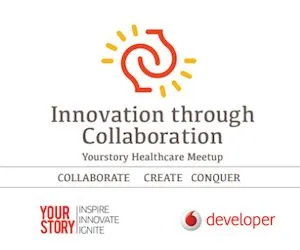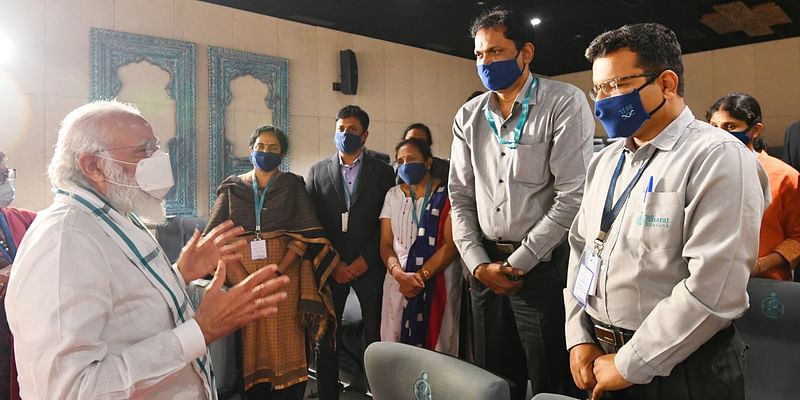15 Tips for Healthcare Startups
A range of tips for healthcare startups and innovators were provided at the YourStory meetup for the Vodafone Developer Program’s ‘Innovations through Collaboration’ held last week in Bangalore.
The insights were discussed and debated in a highly interactive panel featuring a full spectrum of experts: Dr B.P. Subramanya, Surveillance Medical Officer at World Health Organisation; Dr B Y Sudarshana, Pediatrician & Program Officer, Immunization Program, BBMP; Gautam Sathia, MD and CEO, BioQuest Solutions; Srikrishna Ramamoorthy, Partner at Unitus Seed Fund; Dr. VG Vasishta, Founder and CEO, SBF HealthCare; and Jitesh Bhatt, GM M-Healthcare at Vodafone India.

Here are the Top 15 Tips from the discussion:
1. Leverage the power of mobile communications at each stage of health campaigns: awareness, access and affordability. Create mobile ads via SMS as well as rich media; launch educational services via permission marketing; convert offline and internet materials into mobile formats; partner with device manufacturers, operators and healthcare institutes to make mobile health services affordable.
2. Harness wearable computers and the Internet of things: Devices ranging from FitBit to GetActive are making it easier for health-aware citizens to track and interpret their physical activities on a daily basis. Smart embedded sensors will also transform healthcare supply chains and hospital environments through better inventory management.
3. Work out sustainable business models: Find out ways in which subscription based models can be blended with educational campaigns to increase awareness and choice. Work with the broader ecosystem to engage the stakeholders, identify value and define pricing points.
4. Encourage citizens to move from reactive to proactive mode: In India, unlike other Western or Asian countries, citizens act on health issues only when they face problems, but do not adequately plan in advance for healthy lifestyles and pre-emptive health behaviours. Consumer education is needed for people to take health planning into their own hands, and to know how to make smart choices of lifestyle and healthcare providers.
5. Tap youth and digital champions to broaden m-health awareness: Many elders as well as older professionals in the healthcare industry are not as IT-savvy as youth, and hence may not be aware of the usefulness of e-health services – a multi-tier outreach campaign will help here, involving everyone from grassroots workers to younger family members.
6. Identify investors with the right portfolio mix for m-health: Investors such as Unitus Seed Fund have a good track record of targeting m-health startups; develop pitches and partnership strategies customised for their network.
7. Work with healthcare institutions to develop apps that have credibility and pedigree: There are tens of thousands of healthcare apps and Websites with medical tips – how will consumers differentiate between them? Consumers trust reputed healthcare institutes, and may therefore gravitate towards their online offerings as well.
8. Continue to push the boundaries of technology: but do not be under the illusion that computers can replace doctors. It still takes a lot of intelligence for many crucial diagnostic decisions. Chest pain and sweating may indicate a heart attack – but also that someone is in love!
9. Track the growing number of state and central government programmes for healthcare: Governments are under pressure to allocate more of their increasing tax collections to the people, and this includes campaigns against leprosy or tuberculosis or health educational campaigns for children and adolescents. These can be good target areas for m-health startups.
10. Focus on the uniqueness of the local market: It is tempting to develop solutions for higher-paying markets like the US, or ape what is happening in the West. But there are huge opportunities and challenges in the local market as well. Address cultural mindsets, payment channels, and family affinities in cultures like India. Solutions have to be ‘idiot proof’ and even ‘India proof.’ Take cues from other emerging economies also, such as African countries which require healthcare workers to wear GPS devices so that their movements can be tracked and monitored.
11. Government agencies like healthcare ministries should address the growing aspirations of youth employees: They do not want to do just routine jobs, but want to go beyond the regular job descriptions and be more innovative and creative. They are also more plugged in to mobile phones and social media, and can help re-design healthcare processes.
12. Encourage best practices to be shared across states and provinces: Indian states like Kerala have been consistently at the cutting edge of delivering government services via internet and mobiles; a healthy competition between states and cooperation between agencies will help accelerate universal healthcare targets, and startups can tap this competitive spirit to target their offerings.
13. Tap the key growing trends in healthcare: Customisation of services, increased digitisation and mobilisation, and movement of services not just into hospitals but outside as well. Customers today want a range of choices in healthcare, and good advice in how to pick the best plan and most effective tools.
14. Immerse yourself in the healthcare workforce to see where value can be added via ICTs: This can include rounds management in

hospitals, schedule management for doctors, collaborative knowledge networks for nurses, and mapping of idle capacity for specialists.15. Examine the big picture and identify the key pain points in the health system: For example, one third of Indians are overweight. The largest proportion of road accident deaths in the world takes place in India. The medical tourist market accounts for millions of patients in India each year. India’s working class population will reach a billion in 2020. The India market offers scale as well as urgency in solving medical problems, which can be sizeable markets for e-health startups.
In sum, a focus on the big trends and emerging technologies as well as regulatory and compliance issues will help health startups in positioning their offerings for sustainable businesses while also meeting ethical and social responsibility considerations.











![[Weekly funding roundup] Venture investments into Indian startups begin on a muted note in November](https://images.yourstory.com/cs/2/f08163002d6c11e9aa979329348d4c3e/Weeklyimage-1577460362436.png)